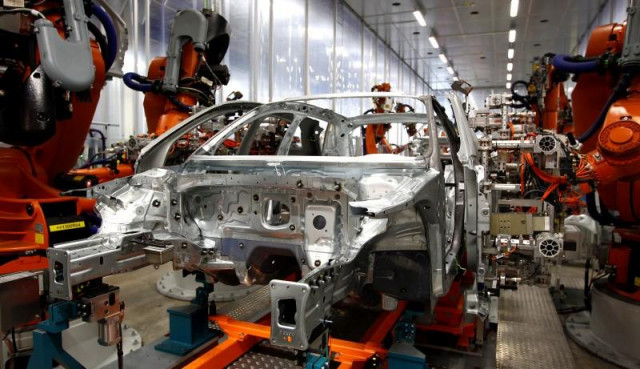Auto industry seeks consistency of policies
Insists changes to the 2016-21 policy will shake confidence of new and existing players

A car manufacturering plant.
PHOTO: REUTERS
Pakistan Association of Automotive Parts and Accessories Manufacturers (Paapam) former chairman Aamir Allawala, in a statement, said the industry had pinned hopes on the new policy and it had started bearing fruits as European, South Korean and Chinese players expressed keen interest in investing in Pakistan.
However, he regretted that hardly two years had passed and the government made multiple changes to the policy. “It will shake the confidence of new players and prevent current players from increasing their capacity,” he said.
He underscored the need for consistency of policies and a predictable regime in order to encourage existing and new players.
“The auto industry provides employment for 2.5 million people directly and indirectly and it can lead to economic boom provided it is supported with transparent and consistent policies. We have to learn from the catastrophic results of deviating from the policies back in 2007,” he added.
After Indus and Suzuki, Honda also raises car prices
According to the earlier policy, raw material could be imported at 1% for the next five years, but the first change came with an additional 1% duty through an SRO in 2015.
Later, another 1% was added to the duty in the 2016 budget, resulting in 3% duty on the import of raw material. “This increase was supposed to be a temporary move, but it still exists in the current duty structure,” he said.
Non-local raw material would be imported regardless of the import duty, he said, adding the increase was reflected in the increased cost of auto parts.
The Paapam chairman said the third change came with 80% regulatory duty on new completely built units (CBU). Later, the Sindh High Court suspended the duty on February 12.
He termed amendment to the used car import policy a major blow to the industry and new investments.
“The industry was hopeful after the government made a decision on used vehicle import payments to be done in foreign currency to curb the misuse of gift and baggage schemes, but it proved short-lived as the state succumbed to the pressure from the undocumented and illegal sector and stepped back.”
“Owing to continuous changes in the new policy, the investors are reluctant to make investment in the automotive sector.
Parts manufacturers are in no position to compete with supplies by overseas suppliers to the original equipment manufacturers (OEMs), while the new OEMs entering the industry with no localisation motive are still enjoying the incentives of reduced duty structure,” he said.
Published in The Express Tribune, March 11th, 2018.
Like Business on Facebook, follow @TribuneBiz on Twitter to stay informed and join in the conversation.



















COMMENTS
Comments are moderated and generally will be posted if they are on-topic and not abusive.
For more information, please see our Comments FAQ